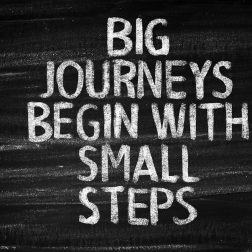 I’ll never forget when a friend called me, asking for some help with his career. I was a bit surprised because he’d told me how much he loved his job. There was room for growth, and he was excited about the support the company provided to the community. I asked what was going on, and why he was considering a career change. His response was that he’d been written up numerous times for being late and was warned he would be let go if he couldn’t be on time.
I’ll never forget when a friend called me, asking for some help with his career. I was a bit surprised because he’d told me how much he loved his job. There was room for growth, and he was excited about the support the company provided to the community. I asked what was going on, and why he was considering a career change. His response was that he’d been written up numerous times for being late and was warned he would be let go if he couldn’t be on time.
And thus, he didn’t think this company was a good fit for him.
I basically (and in a nice way) told him that NO company wants to employ an employee who is consistently late and won’t take responsibility for themselves and their timeline.
Being late is a habit many people struggle with, and it is extremely frustrating for themselves, their colleagues, and their managers. I understand that, in spite of your best intentions, you may feel like you just can’t seem to arrive on time. However, being regularly late has some serious consequences including lost productivity, missed opportunities (personal and career related), and, ultimately, a damaged reputation.
Here are a few tips to help you combat this timely habit:
Analyze your habits and behaviors
Start by analyzing your habits and behaviors to identify what could be causing you to be late. The causes could be anything from poor planning, procrastination, distractions, or even simply underestimating how long travel or tasks will take. Once you’ve identified the habits and behaviors that are holding you back, work on changing them one by one. Small and doable steps are always the best approach. Start with the easiest first. For example, if you’re often late because you underestimate how long it takes to get ready in the morning, set an earlier alarm and give yourself more time to get ready. I’ve coached people who eliminated their tardiness by waking up 15 to 20 minutes earlier and having a timeline for their morning routine.
Plan ahead
Planning is essential for avoiding lateness. Make sure to plan your day ahead of time, including all time constraints and/or deadlines for the tasks you need to accomplish. Consider and factor in any potential obstacles, such as interruptions, traffic, or weather. It can also be helpful to have a backup plan in case of unexpected delays. For example, if you know that your daily commute is often disrupted by train delays, consider leaving earlier or finding alternative transportation.
Set reminders
Set reminders for important events or deadlines to keep yourself on track. This could be anything from setting an alarm on your phone to reminding yourself with a sticky note. I use Google calendar plus an Agendio customized paper-based weekly/monthly planner. (It’s proven that writing one’s schedule, timelines, and goals helps strengthen one’s memory.) And I’ve just started playing around with Notion. Use whatever works best for you, and don’t be afraid to experiment with different methods until you find the best fit.
Value your time and others’ time
Remember that being late doesn’t just affect you – it also impacts others around you. Being late to an appointment is similar to breaking a promise; it’s still an act that can cost you the trust of another person. Make a conscious effort to value your own time and the time of others by being punctual. Doing this will help to strengthen your professional relationships and build trust with colleagues and managers.
Practice patience and self-compassion
Finally, remember that breaking the habit of lateness takes time and effort. Be patient with yourself when you slip up, and simply get back on track as soon as possible. Remember to always be aware of and acknowledge your progress. Small successes will build lasting results, so celebrate your successes, no matter how small they may seem.
By taking a few practical steps to change your habits, you can break the cycle of lateness. Journal and assess your current behaviors and commitments (and work is a commitment) to see what areas may be holding you back. Plan ahead, set reminders, value your time and others’ time, and be patient and compassionate with yourself.
Final encouragement
Set a new self-discipline challenge for yourself: Resolve to always be at least five minutes early for work or every appointment over the next 30 days!



